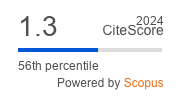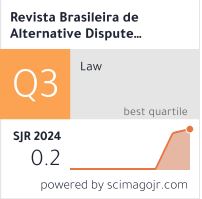Parceria Social
uma forma de solidariedade e uma base para resolução alternativa de disputas trabalhistas
DOI:
https://doi.org/10.52028/rbadr.v7.i13.ART06.URAPalavras-chave:
Disputas Coletivas de Trabalho, Procedimento Alternativo de Resolução de Conflitos, Solidariedade, Parceria Social, Conciliação, Greve, MediaçãoResumo
Muitas constituições ao redor do mundo refletem o princípio da solidariedade, enfatizando os esforços coletivos do Estado, da sociedade e dos indivíduos em prol do bem comum, respeitando os direitos humanos e as liberdades, além de criar condições para sua máxima efetivação. A parceria social adquiriu status constitucional na Rússia após as emendas de 2020, tornando altamente relevante a implementação deste princípio e método de interação nas relações sociais e trabalhistas. A parceria social permite o uso de um método alternativo, em comparação ao judicial, para a resolução de disputas trabalhistas, baseado no diálogo e na cooperação. O objetivo deste artigo é avaliar o potencial de implementação das normas sobre parceria social para a resolução eficaz de conflitos trabalhistas, identificar problemas legais e organizacionais relevantes, e apontar caminhos para sua solução. O estudo utilizou métodos científicos gerais – análise e síntese, dedução e método dialético – e métodos jurídicos especiais – jurisprudência comparada e modelagem jurídica. A análise da legislação russa, sua aplicação prática e a literatura jurídica permitem concluir que a conciliação na resolução de disputas coletivas de trabalho na Rússia é ineficaz devido à imperfeição da legislação trabalhista e à recusa do uso da mediação, o que gera uma resposta negativa entre os juristas. Essa política resulta no uso inadequado das capacidades da parceria social e leva os trabalhadores a utilizarem outros métodos, mais rigorosos e muitas vezes não formalizados, para influenciar os empregadores. Esses fatos exigem o fortalecimento do papel do Estado na parceria social e a promoção da conciliação na resolução de disputas coletivas de trabalho. Há a necessidade de simplificar legislativamente os procedimentos de conciliação. As mudanças poderiam começar com a adoção de uma lei que estabeleça os princípios gerais da parceria social na Rússia, as principais áreas de atuação e o papel de todos os principais atores – o Estado, organizações públicas, empresários e trabalhadores.
Referências
ACKERS P., PAYNE J. British trade unions and social partnership: rhetoric, reality and strategy, The International Journal of Human Resource Management, vol. 9, no 3, pp. 546, 1998.
ALEBASTROVA I.A. The principle of social solidarity in constitutional law: dissertation of the Doctor of Juridical Sciences. Moscow, 2016.
AUBAKIROVA, I.U. Transformation of the paradigm of the social state: theoretical and legal aspect, State Power and Local Self-government, no 6, pp. 3-9, 2014.
BIRYUKOV S.V., EVSTRATOV A.E. The idea of a welfare state in the aspect of state-legal monism and pluralism. Law Enforcement Review, vol. 7, no 3, 15-24, 2023.
CHIRKIN V.E. Some aspects of the constitutional principle of social justice in a comparative di mension. Social justice and law: problems of theory and practice: materials of the International Scientific and Practical Conference/ed. by T.A. Soshnikova, Moscow, Moscow Humanitarian University, pp. 38-44, 2016.
CHIRKIN V.E. The Constitution and the Social State: Legal and Factual Indicators, Journal of Russian Law, no 12(144), pp. 24-37, 2008.
CHUCHA S.Yu. Social partnership in the regulation of labor and other relationship directly related to them, Gosudarstvo i pravo=State and Law, no 1, pp. 130-142, 2022.
CONLY S. Three cheers for the Nanny State, New York Time, no 24, pp. 276-281, 2013.
DONAGHEY, J., CULLINANE, N., DUNDON, T., & DOBBINS, T. Non-union employee representation, union avoidance and the managerial agenda, Economic and Industrial Democracy, 33(2), 163-183, 2012. https://doi.org/10.1177/0143831X11401924;
DUGUIT L. Constitutional Law. General theory of the state. Moscow, 1908.
EBZEYEV B.S. Introduction to the Constitution of Russia: a monograph. Moscow: Norma: INFRA-M, 2019.
FICHTER M., MCCALLUM J. Implementing global framework agreements: The limits of social par tnership, Global Networks, no 15(s1), pp. 65-85, 2015.
FILIPOVA I. A. Mediation in Collective Labor Disputes: Limitations and Opportunities (Taking into Account Foreign Experience), Journal of Russian Law, no 5, pp. 113-124, 2018.
GERASIMOVA E.S. Collective Labor Disputes, Strikes and Protests in Russia: Relevant Laws and Practices, Journal of Russian Law, no 9, pp. 55-65, 2016.
GIDDENS A. The Third Way and its Critics. Polity Press, 2010.
GUEST D., et al. Does partnership at work increase trust? An analysis based on the 2004 Workplace Employment Relations Survey, Industrial Relations Journal, vol. 39, no 2, pp. 124-152, 2008. https://doi.org/10.1111/j.1468-2338.2007.00481.x.
HASTINGS T., SHEEHAN B., YEATES P. Saving the future: how social partnership shaped Ireland’s economic success. Blackhall Publishing, 2007.
HOUSE J. D., MCGRATH K. Innovative Governance and Development in the New Ireland: Social Partnership and the Integrated Approach, Governance, vol. 17, no 1, pp. 29-57, 2004.
IANKOVA E., TURNER L. Building the New Europe: Western and Eastern Roads to Social Partnership, Industrial Relations Journal, vol. 35, no 1, pp. 76-92, 2004.
ILYINA O.Yu. Social Partnership: From Social and Labor Tripartism to a Universal Constitutional Principle, Constitutional and Municipal Law, no 8, pp. 32–34, 2022.
IVANCHINA Yu.V. Fundamentals of the formation of the function of social solidarity and compromise of labor law in Russia, Labor Law Yearbook, no 11, pp. 101-114, 2021.
KELLY J. Social partnership agreements in Britain: labor cooperation and compliance, Industrial Relations, vol. 43, no 1, pp. 267-292, 2004.
KENDALL G. From Liberalism to Neoliberalism, Social Change in the 21st Century 2003 Conference Refereed Proceedings. Centre for Social Change Research, School of Humanities and Human Services QUT, Australia, pp. 276-281, 2003.
KHABRIEVA T.Y., CHIRKIN V.E. Social Justice (Some Constitutional Issues), Social sciences and contemporary world, no 3, pp. 5-14, 2017.
KRYLOV K.D. To the question of the general concept and legal content of social justice, Social jus tice and law: problems of theory and practice: materials of the International Scientific and Practical Conference/ed. by T.A. Soshnikova. Мoscow. Moscow Humanitarian University, pp. 26-31, 2016.
LYUTOV N.L. Collective labor law of Great Britain: a monograph. Moscow: Volters Kluwer Publishing House, 2009.
MALYSHEV M.A. The level of development of social partnership in Russia, Public Administration. Electronic bulletin, no 1, pp. 29-47, 2021.
MUMINOV A., MUMINOV O., NOROV Sh. Social Partnership in Uzbekistan: Status and Prospects, International Journal of Scientific & Technology Reserch, vol. 9, issue 2, pp. 5876-5878, 2020.
Ó CINNÉIDE S. Democracy and the Constitution, Administration, vol. 46, no 4, 1998.
O RIAIN S. Social Partnership as a Mode of Governance: Introduction to the Special Issue, The Economic and Social Review, vol. 37, no 3, pp. 311-318, 2006.
OBUKHOVA G.N. Trade unions of Russia in the system of social partnership: legal regulation, pro blems and prospects of development, Law Enforcement Review, vol. 7, no 3, pp. 135-144, 2023, https://doi.org/10.52468/2542-1514.2023.7(3). 135–144 Access: 19.06.2024.
PAOLUCCI V., ROCHE W. K. Social partnership, company-level collective bargaining and union revitalization in Ireland, Economic and Industrial Democracy, 2024, https://doi. org/10.1177/0143831X231220136 Access: 18.06.2024.
RAKHIMOVA A.M., KAISHATAEVA A.K. The role of trade unions as a subject of social partnership in the settlement of labor disputes, Journal of Advanced Research in Law and Economics, vol. 11, no 3(49), pp. 967-977, 2020.
SAGANDYKOV M.S. A primary trade Union organization as a public representative of the rights and interests of employees, “For the rights of workers. Man of labor and trade unions in the modern world”: materials of the Second International Scientific and Practical Conference (Yekaterinburg, December 21–22, 2016), Yekaterinburg, pp. 179-183, 2016.
SHABUROV A.S. “Rule-of-law” and “Social” in the description of the social rule-of-law state, The Rule of Law State: Theory and Practice, no 3(41), pp. 6-11, 2015.
SHCHETININA O.V. Philosophy of active turn in social policy: priorities of social partnership tech nologies, Legal science and practice: Bulletin of the Nizhny Novgorod Academy of the Ministry of Internal Affairs of Russia, no 1(53), pp. 294-296, 2021.
SPIELMANS J. V. Labor disputes on rights and on interests, The American Economic Review, vol. 29, iss. 1, pp. 299-312, 1939.
STEPANENKO R.F., SOLDATOVA A.V., STEPANENKO H.N. Labor as a manifestation of identity in the construction of a social state (philosophical and legal aspects), Law and the State: Theory and Practice, no 1(217), pp. 45-48, 2023. http://doi.org/10.47643/1815-1337_2023_1_45.
SUSHILNIKOV I.S. The Right to Partnership between Entrepreneurs and Authorities in Russia. Russian Law Journal, no 6, 2022, https://base.garant.ru/77076788/ Access: 14.06.2024.
TULIEV I.R. Social partnership as the main direction of social policy of the Russian Federation, Law Bulletin, no 2, pp. 20-25, 2020.
WILSON E.J., BUNN M.D., GRANT T. Savage anatomy of a social partnership: A stakeholder pers pective, Industrial Marketing Management, https://www.sciencedirect.com/science/article/abs/ pii/S0019850109001461?casa_token=Rx-bqW3UNL0AAAAA:g8QDoinnmQiwEeUXYHb0K3SQAL hz3m-29QOpSnRv06Lic7CLBOoAu9PRA6nV03Tc2aFq0V2cehc Access: 18.06.2024.
XI M., ZHOU L., ZHANG X., & ZHAO S. Labor relations conflict in China: An analysis of conflict measure, conflict solution and conflict outcomes, The International Journal of Human Resource Management, no. 33(17), pp. 3414-3450, 2021. https://doi.org/10.1080/09585192.2021.1 903966.
YUDIN G.B. Collective and individual in the philosophical anthropology of E. Durkheim, Russian Sociological Review, vol. 12, no 2, pp. 122-132, 2013.
Downloads
Publicado
Edição
Seção
Licença
Copyright (c) 2025 REVISTA BRASILEIRA DE ALTERNATIVE DISPUTE RESOLUTION

Este trabalho está licenciado sob uma licença Creative Commons Attribution 4.0 International License.
Não serão devidos direitos autorais ou qualquer outra remuneração pela publicação dos trabalhos.
As opiniões emitidas pelos autores dos artigos e resenhas são de sua exclusiva responsabilidade.







